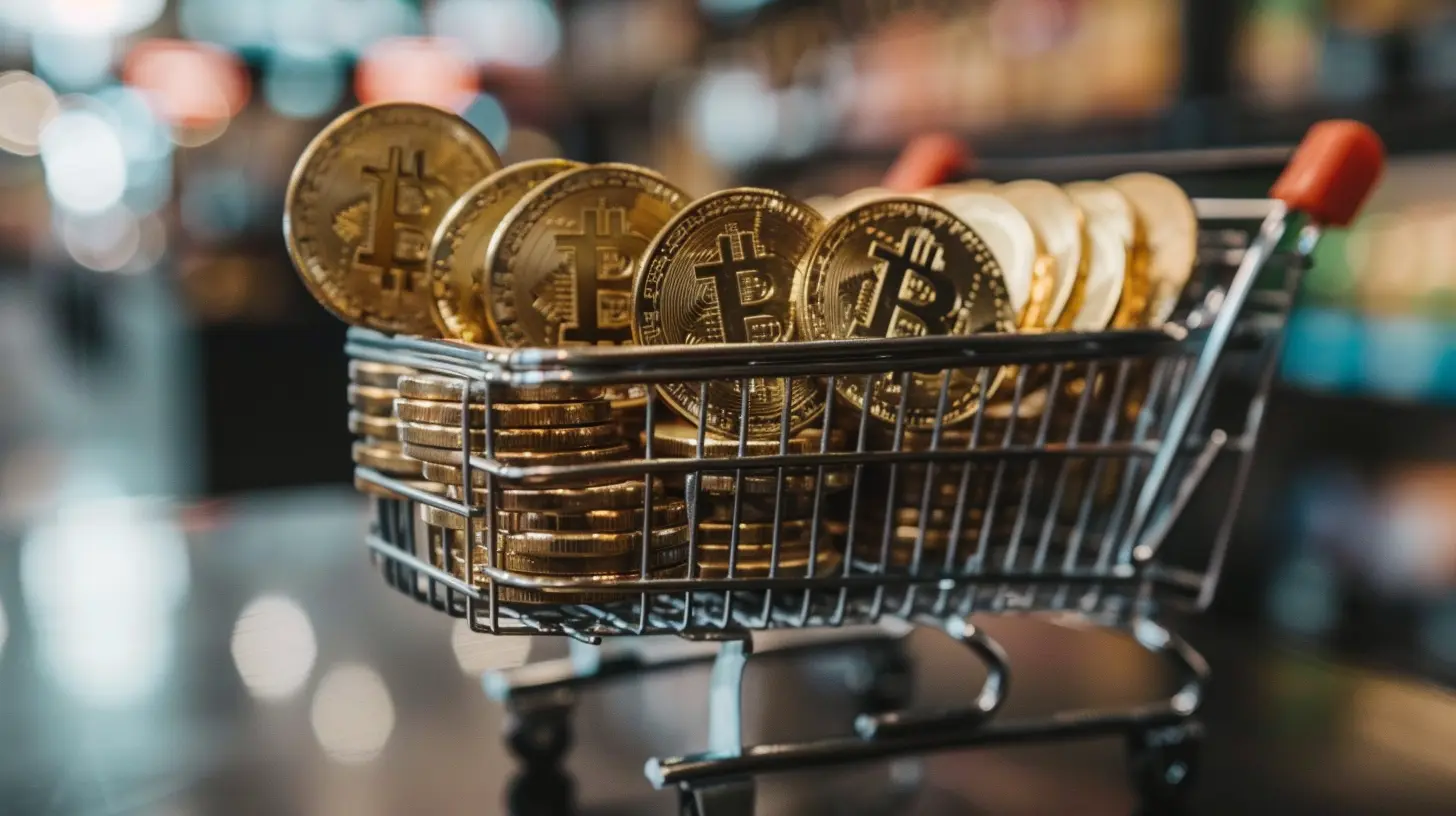14 April 2025
Blockchain. If you’ve been anywhere near a headline in the last decade, you’ve probably come across this word—and maybe instantly paired it with cryptocurrency. While it’s true that blockchain technology underpins cryptocurrencies like Bitcoin and Ethereum, it’s way more than just a digital money trail.
In fact, blockchain is like that dependable multi-tool you didn’t know you needed—it’s capable of so much more than you'd expect. And it’s reshaping the world of commerce in ways that might surprise you. From supply chain transparency to better loyalty programs, blockchain is rolling up its sleeves and transforming businesses. So, let’s dig into how this tech superstar is turning heads in commerce. 
What Is Blockchain, Really?
Before jumping into its commercial applications, let’s break down what blockchain is. Imagine a digital ledger—a fancy, unchangeable logbook—shared among multiple parties. Every time a transaction happens, it gets recorded in this ledger. And here’s the kicker: the information is encrypted and spread across a decentralized network.It’s like a group chat where everyone gets the same messages, and no one can edit or delete them after they’re sent. This creates trust, transparency, and security without needing a single, centralized authority. Pretty neat, right? 
Why Should Commerce Care About Blockchain?
Now, you might be wondering—what does all this have to do with commerce? Well, businesses thrive on trust, transparency, and efficiency. Guess what blockchain brings to the table? Exactly that! Let’s dive into the practical ways it’s making waves in the world of business.
1. Revolutionizing Supply Chain Management
Have you ever tracked a package, only for the updates to feel like they’re coming from a magic eight-ball? “Your item will arrive… sometime soon.” Frustrating, right? Well, blockchain can fix that.Imagine a system where every single step of your product’s journey—from raw material to your doorstep—is recorded in real time. With blockchain, companies can create a transparent, traceable supply chain.
For example, suppose you’re buying a cup of coffee and want to know where the beans come from. Blockchain can track every step, from the farm that grew the beans to the factory that roasted them. This level of visibility not only builds trust with consumers but also helps businesses identify inefficiencies, reduce waste, and ensure quality.
Big names like Walmart are already hopping on the blockchain bandwagon. They’re using it to trace their food supply chain, ensuring fresh, safe products on your plate. Isn’t that worth the buzz? 
2. Enhancing Payment Systems
Gone are the days of clunky payment gateways that take forever and charge you an arm and a leg. Blockchain offers faster, smoother, and cheaper payment options.Cross-border transactions, in particular, are a headache for many businesses. Traditional banks take days, charge high fees, and add layers of red tape. Blockchain, on the other hand, operates 24/7, making international payments as simple as sending an email.
Companies like Ripple are leading the charge here, using blockchain to facilitate quick and cheap transactions between banks and businesses. Whether you’re a business owner or a customer, this is a win-win.
3. Smart Contracts: Automating Agreements
Let’s talk about contracts. They’re essential in commerce but can be awfully tedious—especially when lawyers, middlemen, and manual processes are involved. Enter smart contracts.A smart contract is like a vending machine. When the right conditions are met (you insert money), the machine triggers a specific action (it gives you a soda). In blockchain, these conditions and actions are coded into a digital contract, ensuring everything happens automatically, with no need for intermediaries.
For instance, suppose two companies agree to ship goods once payment is made. With a smart contract, the blockchain can monitor the payment and trigger the shipment as soon as the funds are received. No delays, no disputes, no drama.
4. Loyalty Programs 2.0
Who doesn’t love racking up loyalty points? But let’s face it—managing them can be a pain. Points expire, they’re often non-transferable, and keeping track of multiple programs can feel like juggling flaming torches.Blockchain can simplify all this. Imagine a single, unified system where loyalty points from different brands can be stored, tracked, and even exchanged. Instead of being tied to one retailer, you could use your points wherever you like—kind of like a universal gift card.
Airlines, retailers, and even coffee chains are exploring blockchain-based loyalty programs. It’s a game-changer for both businesses and customers.
5. Fighting Fraud Like a Pro
Fraud is a thorn in the side of commerce. Fake products, bogus transactions, identity theft—the list goes on. Blockchain helps nip this in the bud.Because blockchain records are immutable (read: impossible to tamper with), they create a solid paper trail. Whether it’s verifying the authenticity of a high-end watch or ensuring that a transaction isn’t duplicated, blockchain acts like a fraud detective on steroids.
Luxury brands like LVMH are already leveraging this tech to authenticate products, ensuring buyers get what they pay for.
6. Revolutionizing Inventory Management
Managing inventory is all about balance—you don’t want too much stock gathering dust, but running out of popular items is every business owner’s nightmare. Blockchain can help companies keep their inventory lean and mean.By integrating blockchain with IoT (Internet of Things) devices, businesses can track inventory levels in real time. For example, sensors can monitor product stock in a warehouse, and blockchain can automatically reorder items when supplies run low.
Think of it as the business equivalent of having a fridge that orders more milk when you’re down to the last carton. Efficient, right?
7. Empowering Peer-to-Peer Commerce
In traditional commerce, middlemen usually take a cut—whether it’s for connecting buyers and sellers or processing payments. With blockchain, we can cut those middlemen out of the equation.Decentralized marketplaces, powered by blockchain, allow peer-to-peer transactions without requiring a central authority to oversee the process. Imagine selling your handmade jewelry directly to a customer on the other side of the globe, with payment and trust powered by blockchain.
Platforms like OpenBazaar are already leading the charge, creating marketplaces where buyers and sellers can interact directly.
8. Reducing Administrative Overhead
Let’s be honest—paperwork is the least exciting part of running a business. But it’s also necessary. Invoices, audits, compliance—you name it. Blockchain can take the grunt work out of these tasks.By storing data on a decentralized ledger, blockchain ensures that records are accurate, transparent, and easy to access. This reduces the need for repetitive checks and balances, cuts down on administrative costs, and makes audits a breeze.
Challenges: It’s Not All Sunshine and Rainbows
Sure, blockchain sounds amazing, but it’s not without its hurdles. For one, implementing blockchain systems can be costly and technically complex. Plus, there’s the issue of scalability—some blockchain networks struggle to handle high volumes of transactions.And let’s not forget regulatory uncertainty. Blockchain is still a relatively new technology, and governments around the world are figuring out how to regulate it.
But, like any game-changing innovation, blockchain is evolving. As the tech matures, these challenges are likely to shrink faster than your leftover pizza in the microwave.
Wrapping It Up
So, there you have it—blockchain may have started as the backbone of cryptocurrency, but it’s quickly proving its worth in commerce. From supercharging supply chains to fighting fraud, it’s clear that this technology is here to stay.The bottom line? Blockchain is like that quiet MVP on a team—it may not always be in the spotlight, but it’s doing the heavy lifting behind the scenes. For businesses willing to embrace this tech, the potential is huge. So, next time someone mentions blockchain, think beyond Bitcoin. Think commerce.




Adrian McBride
Blockchain’s potential transcends cryptocurrency, offering transparency and efficiency that can revolutionize various industries.
April 16, 2025 at 8:19 PM